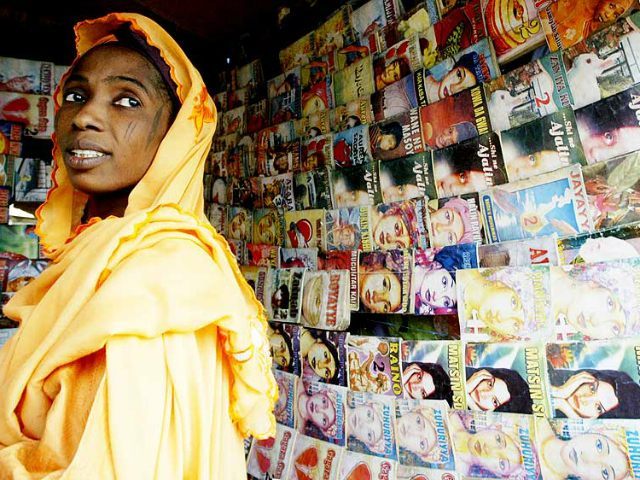Business is booming for the romance novelists of northern Nigeria, the women who write Kano city’s “love literature” from their homes and defy the morality of both the region’s Sharia police and the ISIS-affiliated terrorist group Boko Haram.
Writing of the horrors of child marriage, prostitution, and disease, Nigerian officials have long struggled to muzzle their voices. Yet sales of their serialized novels keep rising.
Known as “Littattafan Soyayya” — “love literature” in the native Hausa language, these serials have been popular for decades, though have experienced a boom given the context of the war against Boko Haram. As CNN notes, most of this literature has yet to be translated in English. The genre’s most famous novel, Sin Is a Puppy that Follows You Home by Balaraba Ramat Yakubu, only made it into English in 2012, 22 years after its initial Hausa publication. It has nonetheless become extremely influential, so much so that the authors of these works are seen as spiritual advisers to the women who read them.
The novels have become increasingly popular as the threat of Boko Haram has made topics such as child marriage and domestic abuse more common; among Boko Haram’s most well-known acts of violence is the mass abduction of underaged girls to be married to jihadis and forced to feed them and produce child soldiers.
Atlas Obscura notes the tradition long precedes Islamic oppression on the part of Boko Haram and has succeeded despite Islamic oppression from official government sources largely due to a market void Littattafan Soyayya has aptly filled. “In the 1980s … the Nigerian economy crashed, and traditional publishing outlets crumbled along with it. This put Hausa writers in a perilous financial position,” one they worked around through female writer collectives that wrote easily reproduced, serialized love stories. Atlas Obscura describes roadside markets as one of the most active hubs for distributing these works: “the same markets that, lately, are better known as attack sites for suicide bombers.”
Glenna Gordon, a Western observer who has published a photograph book profiling the women behind Littattafan Soyayya this year, tells CNN that many of the authors “write their phone numbers on their books … other women call them up and ask for advice.”
Speaking to the New York Times, Gordon noted that the women who write these novels tended to be middle-class and “devout Muslims,” whose husbands were relieved that their job did not require them to leave the house. Despite this, however, Gordon has described these authors as “card-carrying feminist” types who see their work as a way to entice women and younger girls to read more, study more, and write.
Their brand of feminism is explicitly not feminist, however, Gordon warns. “But family is everything in northern Nigeria, and realizing the strength of this choice means that feminism can also encompass more than narrow, preconceived definitions,” she writes. Sin Is a Puppy that Follows You Home, for example, is a story detailing the struggles between first and second wives, and the man’s fight to live up to the responsibility of keeping both happy. It treats this reality as a fact of life, rather than aggressively railing against it as an injustice.
Despite being contextually appropriate for the society in which they take place, the love literature has become over the years a prime target of reproach for Muslim leaders. In 2007, for example, the governor of Kano state organized a book burning he personally attended. The Islamic Sharia police, known has Hisbah has long attempted to censor the romantic content of the books and has succeeded in forcing the authors to have to register with the Hisbah before publishing. More recently, Islamists have claimed that other Islamists — namely, Boko Haram — have made the open discussion of romance too dangerous for women, despite Kano not being one of the nation’s most active hubs of Boko Haram violence.

COMMENTS
Please let us know if you're having issues with commenting.